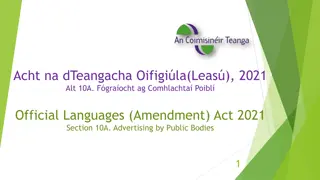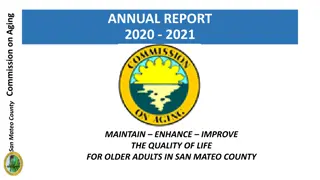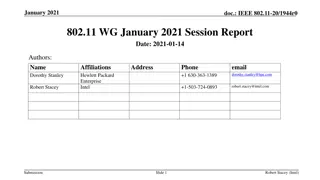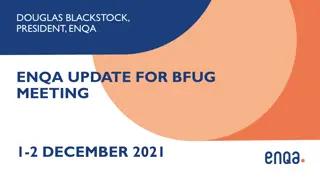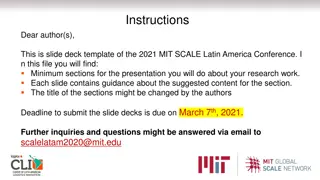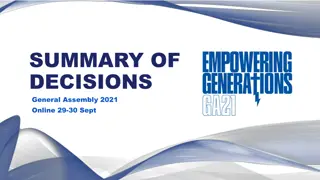
Understanding Modality in Language Communication
Explore the concept of modality in communication, including types of modality, expressions in English and Arabic, and examples of modality notions like obligation, ability, possibility, and more.
Download Presentation

Please find below an Image/Link to download the presentation.
The content on the website is provided AS IS for your information and personal use only. It may not be sold, licensed, or shared on other websites without obtaining consent from the author. If you encounter any issues during the download, it is possible that the publisher has removed the file from their server.
You are allowed to download the files provided on this website for personal or commercial use, subject to the condition that they are used lawfully. All files are the property of their respective owners.
The content on the website is provided AS IS for your information and personal use only. It may not be sold, licensed, or shared on other websites without obtaining consent from the author.
E N D
Presentation Transcript
Modality MARYAM WISSAM SALMAN Course Tutor: Prof. AHMED Q. ABED. PhD
TABLE OF CONTENTS 02 01 Modality Types of modality Modality : Different functions 03 04 Translating modality
01 Modality While communicating with each other, language users are in need of expressing their own attitudes, opinions, or moods towards what happens, towards what exists in the outside world, towards the truth of an utterance, or towards the event described by that utterance. To do so, they need to fall back on modality. Modality is a concept used widely in a direct link
Notions Of Modality Obligation: We must not lose the match tomorrow, or we will be out of the tournament. Lost opportunities: You should have asked me earlier. Now, it s too late Ability: She can speak three languages in addition to her mother tongue Possibility: She may be in the office. Have you called her? Preference: I would rather stay at home tonight than go out. Advisability: She should/ought to consult her doctor immediately. Necessity: I haven t visited my friend for ten years, so I will have to visit her this summer. Prohibition : You mustn t use your mobile during takeoff. Habitual past: My father used to smoke 20 cigarettes a day Lost opportunities: You should have asked me earlier. Now, it s too late Expectation: There are plenty of petrol stations in the town; it should not be too difficult to find somewhere to get petrol Lack of necessity: In order to apply for this job, you must speak two languages, but you don t have to have a degree in international relation Request: Would you switch on the light, please?
02 Types of modality In English, modality is most commonly expressed by modal verbs, such as shall, will, would, can, could, may, might, must, and so on.
English modality is expressed by : Phrases Adverbs Clauses be going to possibly it is possible that be used to probably it is likely that be supposed to etc. it is unlikely that etc. it is probable that etc.
In Arabic, although there is no well- defined class of modals perfectly cor- responding to English modal verbs and expressions (Abdel-Fattah 2005; Almanna 2016; Al-Qinai 2008; Aziz 1989; Farghal and Shunnaq 1999), modality can be expressed by :
Arabic modality is expressed by : Modalized prepositions Modalized verbs Modalized particles etc. , , Modalized prepositional phrases etc
Modality can be classified into two main types, viz. deontic modality and epistemic modality (Almanna 2016; Halliday 1970; Hoye 1997; Jarjour 2006; Lyons 1977; Perkins 1983, among others).
1- Deontic modality 2- Epistemic modality The word deontic means duty , necessity or obligation . It is obligation/necessity-oriented. In other words, it describes how things ought to be (Almanna 2016: 94). However, some researchers (cf. Downing and Locke 1992; Farghal and Shunnaq 1999; Jarjour 2006) hold that deontic modality is also used to indicate permission . The term epistemic means to understand or to have knowledge . Therefore, to express the degree of their commitment to the truth of the prop- osition, the language users can use modal verbs epistemically (cf. Almanna 2016; Downing and Locke 1992; Farghal and Shunnaq 1999; Jarjour 2006). He s studied well; he should pass the exam (expectation) I haven t visited my family for ten years, so I will have to visit them this summer. (obligation and/or necessity)
03 Translating modality As Arabic does not have a well-defined class of modals precisely correspond- ing to English modal verbs and expressions on the one hand, and modality in general is characterized by ambiguity, contextuality, and indeterminacy on the other (cf. Abdel-Fattah 2005; Almanna 2016; Bybee and Fleischman 1995) identifying the function of the modal verb in question should be paid extra attention.
Steps adopted with a slight modification from Bells (1991) cognitive approach : A C encoding the draft semantically, pragmatically, lexico-grammatically and stylistically in the target text here, the translators need to pay attention to the linguistic and stylistic norms of the target language. visual recognition(i.e., reading the original text with a view to identifying the modal verb used) this is an easy task. B D identifying the function of modality in the source text this is the most difficult and challenging task. mechanism of lexical search this requires translation trainees to develop a contrastive competence.
As an illustration, the following example may be considered: I had to get up early yesterday; there were a lot of things to be done. . 1- visual recognition: try your hand at identifying the modal verb used in the source text : it is had to 2- the function of the modal verb : obligation and/or necessity + in the past. 3. mechanism of lexical search: had to can be translated in Arabic into : 4 - encoding the draft semantically, pragmatically, lexico-grammatically and stylistically in the target language, as in ; .
To make this point clear, this example extracted from Hans Kngs book Islam: Past, Present and Future (cited in and translated by Al-Shura q 2016: 23) may be given full consideration : ST T T One might think of the unconditional prohibition against usury, which is hardly compatible with the modern international financial system. In the source text, the modal verb might is used epistemically to express the writer s commitment to the truth of the proposition. Therefore, the function of the modal verb might here is to indicate a possibility. Being aware of the function of the modal verb used, the translator has opted for the modalized particle , thus accurately reflecting the degree of certainty.
04 Modality: Different functions modality can achieve wide-ranging functions; therefore, translators need to give full consideration to these functions prior to adopt- ing their own translation strategy. In what follows, some light will be shed on the main functions achieved by modality in both languages. - Obligation and necessity To express obligation or necessity in English, must, have to, and had to can be used, as in the following examples: I haven t visited my friend for three years, so I will have to visit her this summer.
In Arabic, however, to express obligation or necessity, the following modalized verbs, prepositional phrases, and expressions may be used: ...
References : Almanna, A. (2016). The Routledge Course in Translation Annotation: Arabic-English- Arabic. London/New York: Routledge. Almanna, A., and Almanna, F. (2008). Translation: History, Theory and Practice (in Arabic). London: Sayyab Books Ltd. Al-Qinai, J. (2008). Translating Modals between English and Arabic , Translation and Interpreting Studies, Vol. 3.1/3.2, pp. 30 67. Aziz, Y. (1989). A Contrastive Grammar of English and Arabic. Iraq: Mosul Univer- sity Press. Halliday, M. A. K. (1970). Functional Diversity in Language as Seen from a Considera- tion of Modality and Mood in English , Foundations of Language: International Journal of Language and Philosophy, Vol. 6, pp. 322 361
THANKS! CREDITS: This presentation template was created by Slidesgo, including icons by Flaticon, infographics & images by Freepik Slidesgo Flaticon Freepik




